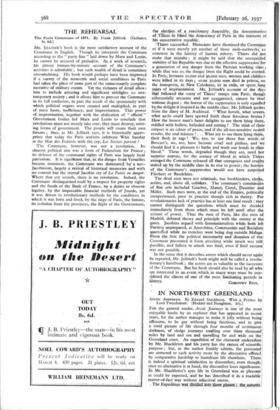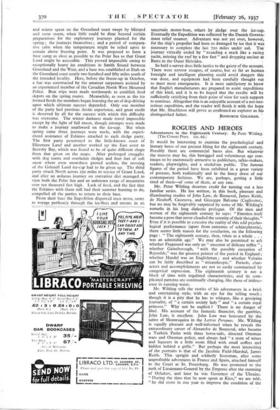IN NORTH-WEST GREENLAND
FOR the general reader, Arctic joianeys is one Of the moat; enjoyable books by an explorer that has appeared in recent years, for the author manages to make it jolly without being; offensive, to be gay without being facetious, and to give a vivid picture of life through four months of continuous darkness, of sledge journeys totalling over three thousand; miles by land and sea and travelling far and *Wide on the Greenland coast. An expedition of the character undertaken: by Mr. Shackleton and his party has the excuse of 'scientific: purpose ; but, as the author frankly admits, the personnel': are attracted to such activity more by the alternative offere,t by comparative hardship to humdrum life elsewhere. Therei is indeed a spiritual satisfaction in discomfort, even though,: Once no alternative is at hand, the discomfort loses significance. In Mr. Shacklethn's eyes life in Greenland was as pleasant is could be expected, and he has -described it in a readable matter-of-fact way without adjectival excess.
The _ExpeditidoW-04-44 iiiftt zoteltitserLat-Auguaini and winter spent on the Greenland coast swept by blizzard and snow storm, when little- could be done -beyond "certain preparations for the exploratory journeys planned for the spring ; the journeys themselves ; and a period of compara- tive calm when the temperature might be relied upon to remain above freezing point. It was proposed to form a base camp as close as possible to the Polar Sea so that Grant Land might be accessible. This proved impossible owing to exceptionally heavy ice conditions in Smith SOund between Greenland and the West, and a base was established at Etah on the Greenland coast nearly two hundred and fifty miles south of the intended locality. Here, before the freeze-up in October, a but was constructed by the amateur carpenters assisted by an experienced member of the Canadian North West Mounted Police. Boat trips were made northwards to establish food depots on the spring routes. Meanwhile, as soon as the ice formed fiords the members began learning the art of dog-driving upon which ultimate success depended. Only one member of the party had previous Arctic experience, and great credit is deserved by all for the success with which this difficulty was overcome. The winter darkness made travel impossible except by the light of full moon, though attempts were made to make a journey southward on the ice-cap. But when spring came three journeys were made, with the experi- enced assistance of Eskimos attached to each sledge party. The first party penetrated to the little-known coast of Ellesmere Land and another worked up the East coast to Scorsby Bay, which was found to be of quite different shape from that given on the maps. After prolonged struggles with dog teams and overladen sledges and four feet of soft snow where even snowshoes proved useless, the crossing of the Grinnell Land ice-cap had to be given up. The third party struck North across 25o miles to sea-ice of Grant Land, and after an arduous journey on starvation diet managed to view both the Polar Sea and an unknown range of mountains over ten thousand feet high. Lack of food, and the fact that the Eskimos with them still had their summer hunting to do, compelled all the parties to return to their base.
From their base the Expedition dispersed once more, some to voyage perilously through the ice-floes and storms in an tins.ertain_ motor-boat,„ others by sledge over .the ice-cag. Eventually the Expedition was collected by the Danish Govern- ment relief steamer. Adventure was not yet over, however, for the ship's propeller had been so damaged by ice that it was necessary to complete the last 700 miles under sail. The journey virtually ended by " rounding a mark like a racing yacht, missing the reef by a few feet " and dropping anchor at Barra in the Outer Hebrides.
So bald a survey does little justice to the gaiety of the account. There were narrow escapes, of course, but so far as human foresight and intelligent planning could avoid dangers this was done, and equipment had been carefully thought out to meet most emergencies. It is most satisfactory to knoir that English manufacturers are prepared to assist expeditions of this kind, and it is to be hoped that the results will be sufficiently satisfying from their point of view for such support to continue. Altogether this is an enjoyable account of a not-ton7 serious expedition, and the reader will finish it with the hope that Mr. Shackleton will prove as confirmed an explorer as his



















































 Previous page
Previous page